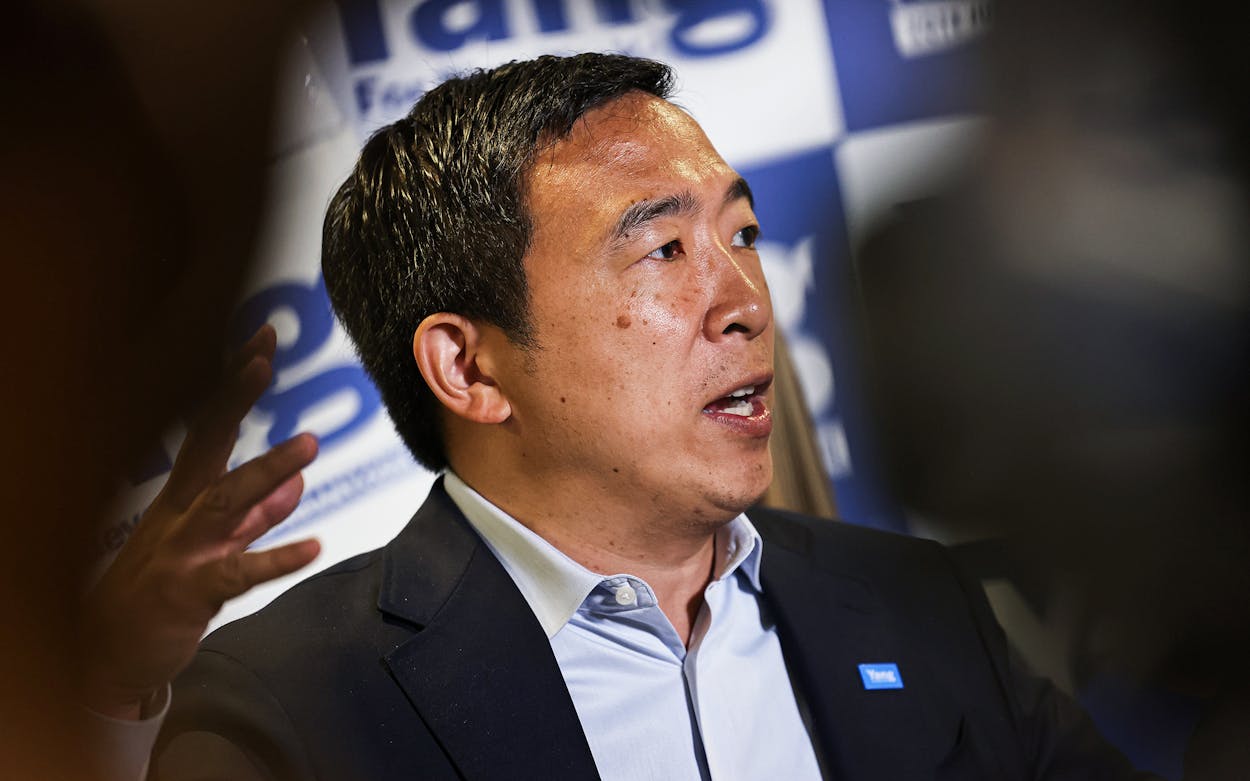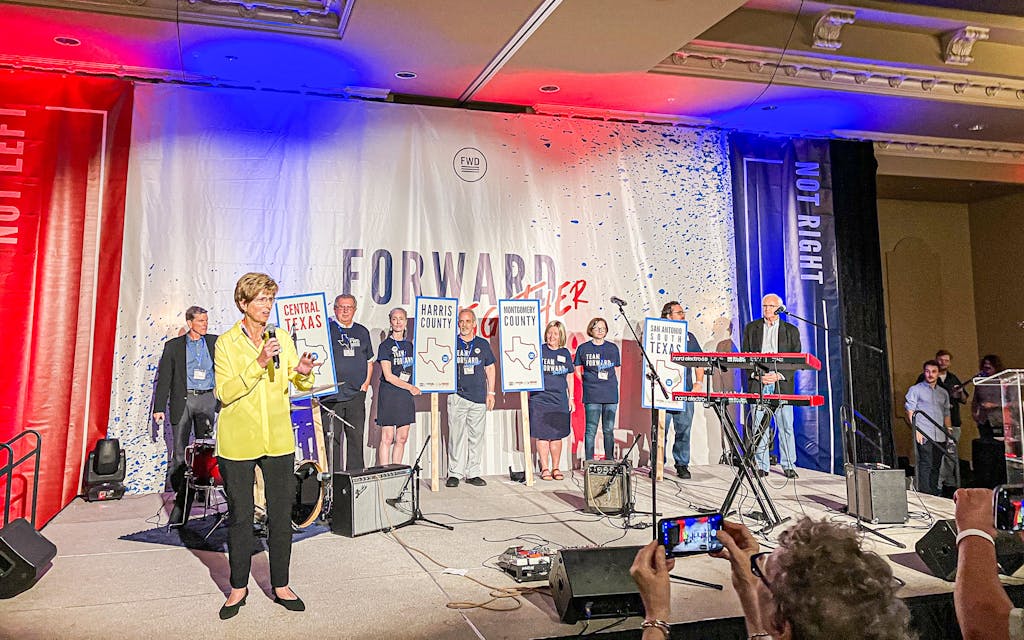The Forward Party Wants to Disrupt Traditional Politics. But Can It Win Elections?
Founded by Andrew Yang, Christine Todd Whitman, and David Jolly, the new party claims to encompass the left, right, and center. Its Houston launch, while well attended, prompted doubts about its viability.

Question: What do you call a political party that disdains both politics and partisanship, boasts of having no platform, and is led by politicians with little in common beyond their lack of recent political success?
a) A paradox.
b) A vanity project.
c) A money-making scheme.
d) The future of American politics.
For the thousand or so people who crowded into Houston’s Bayou City Event Center on Saturday to witness the national launch of the Forward party, the answer was decidedly d. Founded in July by 2020 Democratic presidential candidate Andrew Yang, former Republican governor of New Jersey Christine Todd Whitman, and former Republican congressman David Jolly of Florida, Forward touts itself as “a new kind of party”—a home for the growing number of Americans who feel alienated from both the Republican and Democratic parties.
“Millions of Americans right now are in despair,” Yang, a New York City entrepreneur, told the crowd on Saturday afternoon. “They know there’s a problem, and they’re not sure what to do. Our job today is to come together and start to build a solution. If we can provide a real alternative, Americans will embrace it.” This alternative, as Yang and his fellow party leaders made clear, wasn’t necessarily a different set of policies. Rather, it was a new spirit of political tolerance. Forward would be a party that “embraces left, right, and center,” Jolly explained. “It’s not formed around ideological thought.”

The problem with American politics, as the Forward party sees it, is our increasing polarization. Its leaders believe both major parties have become more ideologically rigid and intolerant of dissent. The remedy is “common-sense solutions” that “move the country forward.” That was an attractive message to many of the attendees on Saturday. “I think our two-party system is broken,” said Elizabeth Winston-Jones, who works for a nonprofit environmental group in Houston. Winston-Jones has voted for both Republican and Democratic candidates. She now believes both parties have been corrupted by corporate money and ideological conformity. “It’s really time for a reset,” she told me.
Public opinion polls suggest that Winston-Jones speaks for a growing number of Americans. In a 2021 Gallup poll, 62 percent of U.S. adults said the Republican and Democratic parties “do such a poor job representing the American people that a third party is needed”—the highest number in the poll’s history. Just 33 percent of Americans said the two parties were doing an adequate job representing the public. “There is too much extremism on both sides,” said Sandy Chau, a retired venture capitalist who traveled from his home in San Francisco to attend the Forward party event. Chau has supported Yang since meeting him in 2018 at a political fundraiser.
The Forward party claims to have no ideology. But anyone listening to the speeches on Saturday would have recognized the technocratic worldview of Silicon Valley, the Aspen Institute, and the World Economic Forum. The Democrats and Republicans were repeatedly dismissed as “legacy parties.” Yang called the two-party system “the biggest design flaw in the history of the world.” There was much talk of the Forward party’s “value proposition.” This was a launch party for what was being hailed by its creators as the killer app of politics. The two legacy parties, it was implied, would soon go the way of the rotary phone.
Unfortunately, the Forward party’s best-known leader displayed a better grasp of tech jargon than of American history. “In another era when America was just as divided as this one, what happened?” Yang asked the crowd at one point. “The Civil War!” several people shouted. It wasn’t the answer Yang wanted. “There was a war, yes,” he acknowledged. “But also, millions of Americans rose up and created a new party, a new movement, that over a period of years served to unify the country.”
He appeared to be referring to the modern Republican party, formed in the 1850s and committed to a very clear (one might even call it ideological) platform calling for the abolition of slavery—a platform that, had the Forward party existed at the time, it would presumably have deemed divisive and extreme. Indeed, far from unifying the country, it was the election of the first Republican president, Abraham Lincoln, that ignited the Civil War. Such details were evidently of little interest to Yang, who quickly moved on to selectively quoting the Founding Fathers on the dangers of partisanship.
The Republican party aside, the traditional role played by third parties in American politics is that of spoiler. Were it not for Ralph Nader and Jill Stein, we might have had presidents Al Gore and Hillary Clinton. Were it not for Ross Perot, President George H.W. Bush might have won a second term. Bill King, who has twice run unsuccessfully for Houston mayor and now serves as the Forward party’s Texas cochair, assured me that the new party would not have the same effect. Because of its centrism, he said, it would draw votes away from both parties—not tipping the election either way, but merely offering voters an alternative.
It may be a while before anyone can vote for a Forward party candidate. Like every new party, Forward must go through a separate process to get on the ballot in each state. It plans to field its first candidates by the end of 2023. In Texas it aims to compete in the 2024 election—but first it must collect approximately 90,000 signatures from supporters who have not participated in either the Democratic or Republican primary. According to its website, the initial focus will be on local races; “no one on the Forward team is currently planning to run for president” in 2024.
Perhaps it’s not a surprise that no Forward party leader plans to run for president. Whitman hasn’t run a political race since winning a second term as New Jersey governor in 1997. Jolly is a one-term Republican congressman and failed U.S. Senate candidate. Yang did not win a single state in the 2020 Democratic primary, collecting less than half a percentage of all votes cast before he dropped out. The following year he ran for mayor of New York City, placing fourth—a particularly devastating loss, given that the city uses the ranked-choice voting system long touted by Yang as a solution to America’s democratic woes.
The Forward party founders now seem to spend most of their time speaking at conferences or pontificating on cable news—which makes their evident antipathy to the news media especially odd. Asked by a moderator about the skepticism that has greeted the Forward party from some in the media, who have questioned its viability and lack of a platform, several speakers hinted darkly at a conspiracy to silence voices and protect America’s political duopoly. “When they go overboard on their criticism, they’re criticizing you,” Jolly—a paid contributor for NBC and MSNBC—told the audience. “They’re saying you’re not allowed to exercise your politics, you’re not allowed to exercise your franchise.” Yang, a paid CNN contributor, agreed. “You can tell how disingenuous the criticism is, because it really is put out by people who are getting paid by the status quo.”
Despite the packed house in Houston, it remains unclear whether the Forward party has a constituency—a silent majority just waiting to be activated by a message of compromise and civility—or whether it’s a kind of Potemkin party that exists mainly on social media and the convention circuit. Is this the tea party for centrists, as its most fervent supporters seem to think, or simply a bid by B-list politicians to remain relevant?
American politics is certainly in a bad place. The Forward party has diagnosed some real problems—excessive extremism, winner-take-all primaries, partisan gerrymandering, campaign finance, and much else. But in order to solve these problems, the party will have to do something that seems highly unlikely—win elections. Can the Forward party move beyond platitudes into the realm of real political reform? I guess you could class me among the skeptics. Then again, maybe I’m just getting paid by the status quo.
"politic" - Google News
September 26, 2022 at 07:00PM
https://ift.tt/yiWmtvs
The Forward Party Wants to Disrupt Traditional Politics. But Can It Win Elections? - Texas Monthly
"politic" - Google News
https://ift.tt/RFdCsT4
https://ift.tt/cjkhuKY
/cloudfront-us-east-1.images.arcpublishing.com/bostonglobe/VNG7YMZTRWJ5WBFTJ5NVETPCQI.jpg)
No comments:
Post a Comment